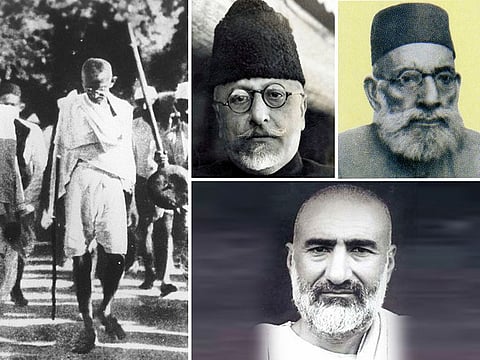Meet the Muslims who fought for India
Remembering their part in freedom struggle is the perfect tribute this Independence Day

Seventy-five years ago, when India became independent, many thought India wouldn’t survive. It was just too diverse to stand as a united nation.
The critics seemed to have a point when a violent Partition took place. One of the legacies of this Partition has been the rise of majoritarian extremism in India. These religious nationalists often question the loyalty of Indian Muslims; they ask why Hindus should not get a Hindu nation just like Muslims got Pakistan.
Part of the answers to these questions lies in the history of the Indian freedom movement, an inclusive mass movement that saw the participation of people from all walks of life — rich and poor, north and south, Hindu and Muslim.
Just because one group of Muslims succeeded in the creation of Pakistan, it does not mean that all Indian Muslims were backing Pakistan. As India turns 75, it is important to remember the stories of Indian Muslim leaders who fought for India.
Playing on the front foot
Some Indian Muslims are reluctant to recall the community’s contribution to the Indian freedom struggle because they don’t want to appear ‘apologetic’ about being Muslim, as if they have to earn the right to be equal citizens by proving that Muslims participated in the freedom struggle.
There is a thin line between appearing apologetic and claiming what is yours. Asaduddin Owaisi, the Lok Sabha MP from Hyderabad, has been sharing the stories of Indian Muslim freedom fighters on social media for the last few days. He has shown how powerful these stories can be in an era when historical debates are central to present politics.
Owaisi counts the first Siraj-ud-Daulah as the first freedom fighter against the British. The Nawab of Bengal, he fought the famous Battle of Plassey against the British East India Company. He lost the battle, not least due to the defection of his general Mir Jafar. In popular political idiom in India today, Mir Jafar has become a byword for traitor. But what was Siraj-ud-Daulah’s fault that he is not remembered by history as someone who resisted the colonial takeover of India?
It is a matter of shame that I had never heard of stalwarts like Hasrat Mohani of Uttar Pradesh, the first Indian to call for complete independence rather than just autonomy under British rule.
In Hyderabad, Owaisi organised a mushaira, a poetry recital event, on the theme of Indian Muslim freedom fighters. Such cultural reclaiming of what is one’s own does not sound defensive or apologetic. It is assertive and challenges the narrative tropes of majoritarianism.
We see every now and then how powerful a force nationalism can be in Indian politics. We have seen the power of the Indian flag when used by unhappy citizens, from the Lokpal movement of 2011, the anti-Citizenship Amendment Act movement of 2019, and the farmers’ movement of 2021.
Just like individuals and political parties, communities too can change the narrative about themselves in politics by appropriating nationalism in their way.
‘Encyclopedia of Indian Muslim Freedom Fighters’
The contribution of Indian Muslims to the freedom struggle is so completely forgotten in public memory that writer Syed Ubaidur Rahman decided to publish a book titled “Biographical Encyclopedia of Indian Muslim Freedom Fighters.”
There are many books on the subject, by this collection of short sketches is so exhaustive it justifies the term ‘Encyclopaedia’. The first name on the list is that of Bahadur Shah Zafar, the last Mughal Emperor. Not many think of the tragic figure of Zafar as a freedom fighter, but after the 1857 Mutiny he was such an icon of resistance against the British that they had to exile him to Rangoon in present-day Myanmar.
For all the propaganda against the Mughals we hear today, we must remember that Zafar was the face of a mass rebellion which had both Hindu and Muslim participation.
Also Read: India’s Renaissance is still unfinished
Going through these sketches in Rahman’s book or Owaisi’s exhaustive Twitter thread is also to hear fascinating nuggets of India’s history.
It is a matter of shame that I had never heard of stalwarts like Hasrat Mohani of Uttar Pradesh, the first Indian to call for complete independence rather than just autonomy under British rule. Mohani also coined the slogan Inquilab Zindabad! (Long live the revolution), which is used to this day in political agitations in India.
Yusuf Mehrally coined the slogan “Quit India” for the movement Mahatma Gandhi launched in 1942. He was jailed eight times.
The list is long and includes minor characters who changed the course of history with small acts of sacrifice and patriotism. These include people like Batak Mian, the cook in Champaran who refused a British planter’s demand to poison Mahatma Gandhi’s food.
Taking charge of the story
If you ask an average Indian to name some Muslim freedom fighters, you may not get any name beyond Maulana Abdul Kalam Azad. Those who remember their school history textbooks might be able to recall Khan Abdul Ghaffar Khan or “Frontier Gandhi”. That’s about all.
Rahman writes in his encyclopedia, “While there is an effort to obfuscate Muslims’ contribution to the freedom movements, spanning from 1800 to 1947, there doesn’t seem to be any concerted effort on the part of the 200 million strong Indian Muslim community to preserve its own history.”
It is time to change that because those who don’t tell their own story have their histories written by their oppressors.
Sign up for the Daily Briefing
Get the latest news and updates straight to your inbox




